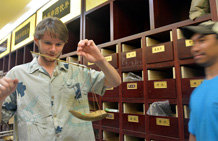
Q&A About Middle East Respiratory Syndrome
Source: en.nhfpc.gov.cn
Updated: 2015-06-03
Q: How can humans get infected with the virus?
A: It remains unknown how humans can be infected with the virus. In some cases, the virus seems to be spread by close contact, as has been shown among family members, patients and medical workers. Recently, infection has been on the rise among healthcare workers. In some cases in communities, possible sources of infection have not been found. Patients could have been exposed to animals, people, or other sources of infection.
Q: Can the disease be transmitted human-to-human?
A: Yes, but only in limited range. It doesn't seem easy for the virus to spread from person to person, unless there is close contact, as when visiting a patient without protection. Human-to-human transmission is more likely to occur in hospitals, especially when precaution and control measures fall short.
Q: What's the source of infection?
A: All the sources of infection are not fully clear. Matched viral strains were found in camels in Egypt, Qatar and Saudi Arabia. Many studies have found virus antibodies in camels in Africa and the Middle East. Virus gene sequence shows close connection between humans and camels. There might be other hosts.
Q: Should human beings avoid contact with camels or camel products? Is it safe to visit farms, markets or camel fairs?
A: General preventive measures should be taken when going to farms, markets, barns or other animal places. It's advisable to wash hands often and avoid contact with sick animals.
Eating raw or undercooked animal products, such as milk and meat, involves high risk of infection with a variety of pathogenic microorganisms. Animal food that is fully cooked or pasteurized is considered safe. Cooked food should be kept away from uncooked food to avoid cross contamination. Camel meat and milk are nutritious after going through sterilization, cooking or other heat treatment.
Before more information is obtained, those with diabetes, chronic lung disease, renal failure, or low immunity, are considered to be at high risk of catching MERS-CoV. Therefore, these people should avoid contact with camels or undercooked meat.
Farm and slaughterhouse workers should develop good personal hygiene habits, such as washing hands after contact with animals, wearing feasible facial protection and protective clothing (which should be taken off and cleaned every day after work).Workers should also keep family members from contacting dirty work overalls, shoes or other items that are contaminated by camels or camel feces. Slaughtering or eating sick animals should be avoided. Keep from animals that are confirmed to be infected with MERS-CoV.
Q: Is there vaccine against MERS-CoV? What are existing treatment methods?
A: There is no effective vaccine or specific treatment at the moment. Treatment is mostly supportive and depends on patient's conditions.
Q: What is the risk of medical workers catching MERS-CoV?
A: There have been cases where patients infected medical workers at hospitals in some countries. Early detection is not always assured, because the symptoms are not very distinctive as compared with other diseases. Therefore, medical workers should always take standard protection measures when treating patients. When treating patients with acute respiratory infection, precautions against spittle should also be applied. Contact precautions as well as eye protection should be taken when treating suspicious or confirmed MERS patients. Measures against airborne transmission should be taken when operations can produce aerosol.
Q: Is it safe to travel to the Middle East? Are there any suggestions from the WHO on travel and trade restrictions?
A: The WHO doesn't encourage any travel or trade restrictions at any port of entry with regard to the disease.
Q: How is the WHO coping with the MERS outbreak?
A: WHO is working with clinicians and scientists to collect and share scientific evidence to better understand the MERS-CoV and the MERS. It aims to pinpoint coping methods, treatment strategy and clinical management. WHO is coordinating a global health response with related countries and international partners. Its efforts include offering the latest information on the disease development and carrying out risk evaluation. It's also working with relevant national authorities in conducting joint investigations, holding scientific sessions, offering temporary monitoring guidance and training to health administration and technical institutes, and developing lab testing, infection precaution and clinical management. WHO's secretary-general held an emergency committee session under the framework of the international sanitary regulations, to discuss whether the event is a public health emergency and what measures should be taken. The emergency session will be held again depending on the epidemic development.
Q: What are WHO's suggestions?
Member states
WHO encourages all member states to strengthen the monitoring of severe acute respiratory infection (SARI), and trace all abnormal SARI and pneumonia cases back to their roots. Member states are also required to report to WHO all suspicious and confirmed cases. They are also encouraged to improve the understanding of MERS.
Medical workers
Infection prevention and control measures are very important for preventing the spread of the MERS-CoV at healthcare facilities. Proper measures should be taken at those facilities, where suspicious and confirmed patients are treated, to reduce risks of infections from MERS patients to other patients, medical workers and visitors. Medical workers should receive training on infection prevention and control and update their knowledge.

World Family Summit
The World Family Organization was founded in Europe in 1947 and headquartered in Paris.
Link: China's Central Government / World Health Organization / United Nations Population Fund / UNICEF in China
Copyright 2014 National Health and Family Planning Commission of the PRC All rights reserved






